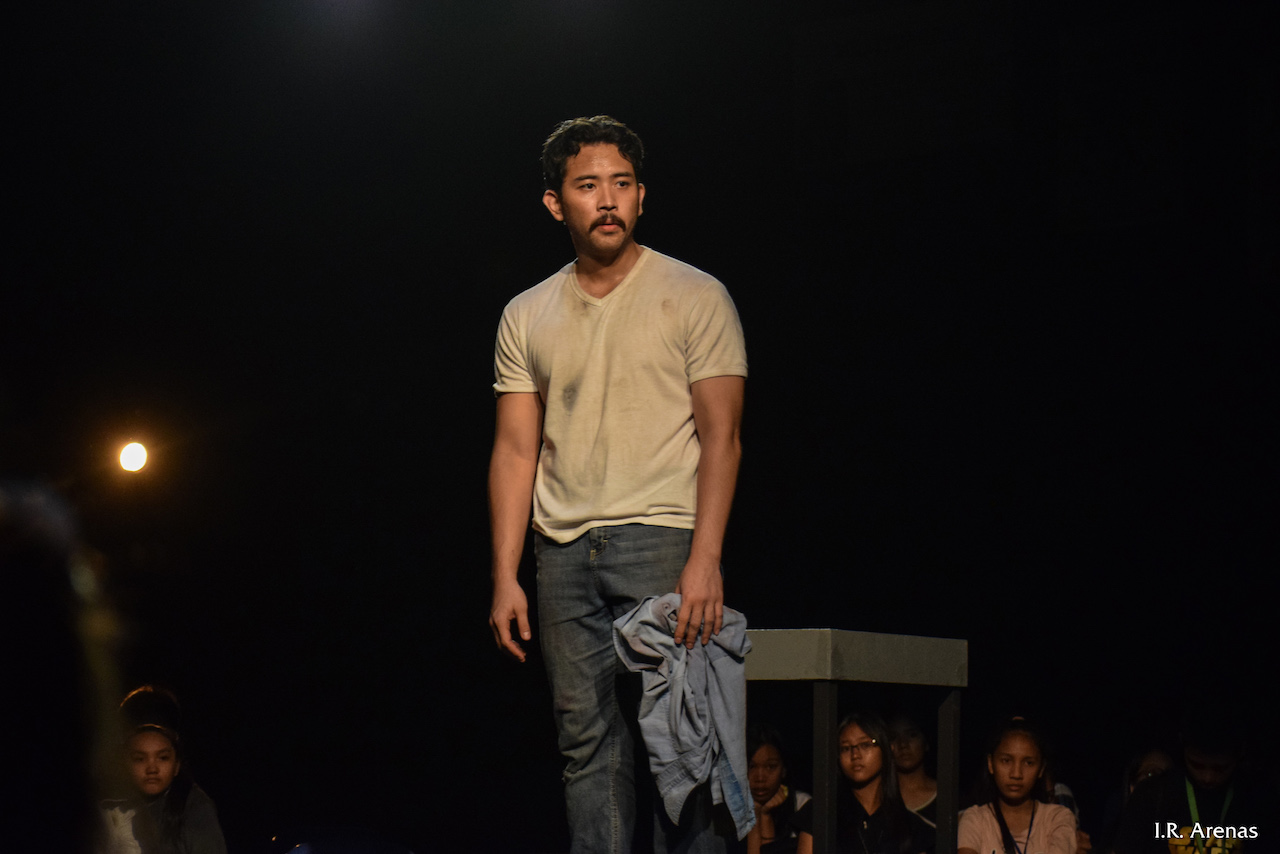
REVIEW: “Desaparesidos” is haunting and imperative theater
August 16th was the one year anniversary of the murder of 17 year old Kian Delos Santos. That afternoon, as I crossed the footbridge on my way to the Ateneo campus, protests were being held near the school entrance to commemorate Kian’s death, as well as the continuing injustice of police brutality. It was a sobering juxtaposition, given the reason I was on my way to Ateneo in the first place was to watch Desaparesidos — an adaptation of Lualhati Bautista’s Martial Law novel of the same name.
The gravity of the material is made clear as soon as you step inside the Doreen Fernandez Black Box Theatre at the new Areté building. Walls are covered with newspaper clippings of the violence in the 70’s, and a running video of Marcos and his cohorts is flashed on screen. Audiences are seated around a small stage situated in the middle of the theater, creating a very intimate and personal setting.
Desaparesidos opens with the cast standing amongst its audience, a subtle way of stating that this is our collective story and history. The story centers around Roy (played by Brian Sy) and Anna (played by Chic San Agustin-De Guzman), two underground rebels committed to fighting against the injustices of Marcos’ authoritarian rule. Choosing to live such a life meant that none of them could lead an ordinary, peaceful existence. They, their comrades, and even their innocent families are subjected to unspeakable acts of violence — murder, torture, rape.
The danger of showing the abuses of our authoritarian past is that the conversation inevitably devolves into a caricature of the good guys vs. the bad guys. Or worse, it becomes romanticized as some sort of golden age of Filipino ingenuity, or Filipino patriotism, or Filipino beauty — depending on which “side” you are on. Director and writer Guelan Varela-Luarca made sure that none of that trope would come out on this show. While many of the violent atrocities were laid bare on stage, the soul of the show is really the emotional exploration of the characters — the hope, the grit, the guilt, the despair — all embroiled throughout their fight for freedom. Varela-Luarca’s adaptation of the novel greatly humanizes their struggle. The characters are not merely victims of history, but are fully fleshed-out people, capable and responsible for their choices. The director also makes excellent use of the performance space, going beyond the confines of a traditional visual staging by using sound and symbolism as powerful storytelling mechanisms. Violence exhibited through shadows and discarded items is infinitely more horrifying than if it were explicitly enacted.
The cast delivers a collectively stellar performance. Brian Sy, Chic San Agustin-De Guzman, Teetin Villanueva, Brian Arda, Joel Saracho, Gigi Escalante, Jerome Dawis, Jewel Tomolin, Maxine Ignacio, Jojo Cayabyab, Gabo Tolentino, Xander Soriano, and Miguel Morales all give such nuance and vulnerability to their roles. While Sy and San Agustin-De Guzman are notably exemplary as Roy and Anna respectively, the strength of Desaparesidos is drawn from the weaving in and out of the personalities played by the whole cast.
These characters? They could be you or me. That in itself is the gut punch that the audience palpably feels.
The first act ends at the cusp of the 1986 EDSA Revolution. And for that evening, the show ended for us too. One of the leads was unfortunately suffering an ankle injury and could not continue with the technical dry run. After a harrowing, emotional, and immersive theater experience, we were left stunned and without closure.
The decision to watch again was an easy one to make. Aside from just needing to know how the story plays out, the first act was so impactful and so memorable that I couldn’t shake it out of my system for days. Serendipitous too, that in the week between viewings was the current president’s pettiness of not wanting to commemorate Ninoy Aquino Day, as well as the Marcos offsprings’ arrogant calls for moving on and forgetting their family’s sins. It’s a cutting reminder why a show such as Desaparesidos is still relevant and necessary.
The second act of the play continues to follow Roy and Anna in the aftermath of the Marcos regime. They have a daughter, Lorena (played by Jewel Tomolin), who resents her parents for continuously choosing country over family in spite of their own emotional brokenness. She feels that their activism didn’t bring about positive change. It’s a painful lament that echoes to present day. The show concludes on a somewhat conciliatory tone, with Roy and Anna coming to terms with their past, and Lorena learning to engage in activism in her own terms. In the background, a video montage of present day, of the Marcos family actively engaging in historical revisionism.
Producers Jenny Jamora, Renante Bustamante, and Kalil Almonte ends every show with a short talk back, inviting different people who share first hand accounts of their experience during Martial Law. The show in itself is already quite painful and paralyzing, but it becomes even more so when there’s a regular person on stage telling you that yes, this is still our present reality. I went back to the theater hoping to find closure from my first attempt, but instead I left with more reflections and perplexities than before.
Desaparesidos is such an important story that deserves to be told and retold to a country that has never fully reckoned with its history. It’s not everyday that a piece can be beautiful and well-executed and well thought-out and deeply relevant all at the same time. Desaparesidos is all of that.

